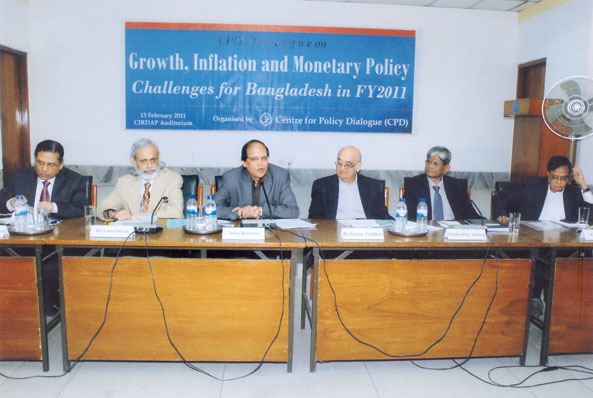“We have to maintain policy flexibility and policy autonomy to attain faster growth, but borrowings from the IMF could limit the government’s fiscal flexibility and may lead to pursuing a contractionary monetary policy by the Bangladesh Bank.” These observations were made by CPD Executive Director Professor Mustafizur Rahman while sharing his views on the emerging challenges facing Bangladesh economy in the second half of FY2010-11. He was presenting the CPD keynote paper of the dialogue on Growth, Inflation and Monetary Policy: Challenges for Bangladesh in FY2011. CPD organised this dialogue on 13 February 2011, at the CIRDAP Auditorium, Dhaka which Dr Atiur Rahman, Governor, Bangladesh Bank attended as the Chief Guest. Dr Salehuddin Ahmed, Former Governor, Bangladesh Bank; Dr Rizwanul Islam, Former Special Advisor, ILO, Geneva and Dr Ahsan Habib Mansur, Executive Director, Policy Research Institute (PRI) attended the dialogue as Designated Discussants. Professor Rehman Sobhan, Chairman, CPD chaired the dialogue.
According to the CPD study, the conditionalities associated with the proposed one billion dollar IMF loan could push the country towards a contractionary monetary policy, and in the end it could lead to a rise in the interest rate. The CPD study also observed that in the past, Bangladesh Bank at different times, rejected at least four IMF recommendations including the adoption of Policy Support Instrument (PSI), introduction of a tighter monetary policy, raising cash reserve ratio (CRR) for the scheduled banks, and opening of the capital account. If this proposed loan of IMF is disbursed, 11 steps will have to be taken by the country as per agreed conditionalities, some of which will not be in Bangladesh’s interests.
The study observed that Bangladesh economy was going through a turning point and some tensions were emerging which included rising inflation, volatility in the stock market, risky exposure of commercial banks to the stock market, instability in the foreign exchange market, and a slowdown in remittance inflows. Bangladesh Bank had been reactive instead of being proactive in monitoring the involvement of commercial banks into capital market. The CPD study also looked into prospects for economic growth in the near term. It was noted that for a sustainable and inclusive development, Bangladesh economy needs to experience structural changes based on promotion of productive sectors which are heavily underutilised, especially in the agricultural sector.
Dr Ahsan Habib Mansur emphasised on the stability of the foreign exchange market and opined that if the present tension continues, remittance flow will start to fall. Expressing concern over the liquidity situation in the market, he suggested that mitigating liquidity expansion should be one of the highest priorities. Dr Rizwanul Islam drew attention to the need for productive employment for speedy growth since the rate of unemployment and underemployment in the country increased to 5.9 per cent and 28.7 per cent respectively in recent times. He also noted that for a developing country like Bangladesh reducing poverty should be the ultimate goal instead of promoting just the GDP growth.
Mr Ziaul Hassan Siddiqui, Deputy Governor, Bangladesh Bank said that the central bank has kept broad money supply target unchanged at 15.2 per cent for FY2010-11, which is higher considering the country’s inflation and GDP growth. He also ruled out the alleged mistake of enforcing CRR hike at a wrong time, arguing that the central bank had increased the CRR with a view to curbing inflationary pressure on the economy. Mr Sanjay Kathuria, Lead Economist, World Bank commented that investment should exceed savings in a country like Bangladesh. For this the government has to ensure a transparent and regulatory environment to attract foreign direct investment.
Explaining the main objectives of the present monetary policy, Dr Atiur Rahman stated that it focused not only on controlling inflation, but also on growth and structural changes. He expressed his intention to provide support to the productive sectors and said that obtaining inclusive growth is now the first priority of Bangladesh Bank. The Governor further informed that they are now discussing with ADB to develop the country’s bond market to ensure long-term reforms in the capital market and real estate sector. Former Bangladesh Bank Governor Dr Salehuddin Ahmed expressed concern over the bubbles in the stock market, saying that any financial crisis is preceded by a bubble. He also emphasised on the reform of Securities and Exchange Commission (SEC) and its policies.
Professor Rehman Sobhan termed the country’s capital market as a ‘casino’ where people entered not to invest but to make quick money. He called for efficient management and control of the market, and urged the authorities to take steps so that credible investors are attracted to it. He suggested that remittance can be utilised for growth instead of foreign aid.




